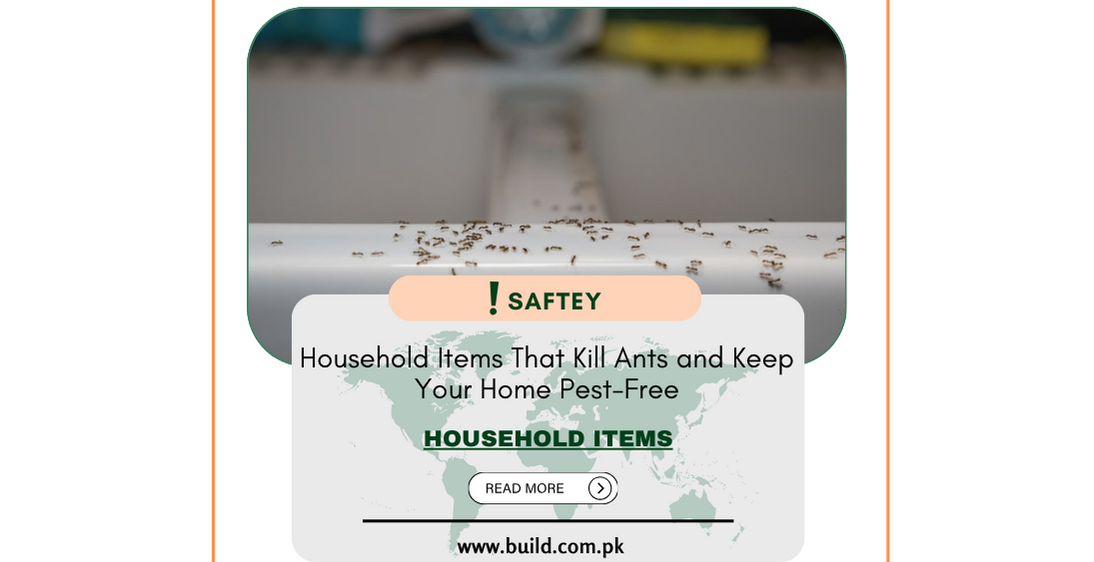Household Items That Kill Ants and Keep Your Home Pest-Free

Introduction:
Ant infestations can be a persistent nuisance in many
households, requiring effective solutions to eliminate them and prevent their
return. While professional pest control services are an option, there are also
several household items that can be used to effectively kill ants and keep your
home pest-free. In this detailed guide, we explore a variety of household items
that are known to be effective in combating ant infestations, along with
instructions on how to use them safely and efficiently. From natural remedies
to common pantry staples, discover the power of houshold items in eradicating
ants and maintaining a pest-free environment in your home.
Understanding Ant Infestations:
Ant infestations typically occur when these tiny insects
enter homes in search of food, water, and shelter. They are attracted to sugary
substances, grease, and other food sources commonly found in kitchens and
pantries. Once inside, ants lea ve behind pheromone trails that lead other ants
to the food source, resulting in a persistent infestation if not addressed
promptly.

Household Items That Kill Ants
Boric Acid:
Boric acid is a natural mineral compound that is toxic to
ants but relatively safe for humans and pets when used as directed. To use
boric acid as an ant killer, mix it with powdered sugar or another bait and
place it in areas where ants are commonly seen. The ants will be attracted to
the bait, consume the mixture, and carry it back to their nest, where it will
kill the entire colony over time.
Diatomaceous Earth:
Diatomaceous earth is a fine powder made from fossilized
algae that is highly effective in killing ants and other insects by dehydrating
their exoskeletons. To use diatomaceous earth as an ant killer, sprinkle it in
areas where ants are present, such as along baseboards, entry points, and ant
trails. The powder will stick to the ants' bodies and eventually cause them to
die from dehydration.
Vinegar:
Vinegar is a common household ingredient that can help repel
ants and disrupt their pheromone trails, making it difficult for them to navigate
and find food sources. To use vinegar as an ant repellent, mix equal parts
vinegar and water in a spray bottle and spray it along ant trails, entry
points, and areas where ants are commonly seen. Reapply the solution as needed
to maintain its effectiveness.
Baking Soda and Powdered Sugar:
A mixture of baking soda and powdered sugar can be an
effective homemade bait for killing ants. Mix equal parts baking soda and
powdered sugar and place small piles of the mixture in areas where ants are
active. The ants will be attracted to the s ugar but will ingest the baking soda
as well, which reacts with the acid in their digestive systems and kills them.
Essential Oils:
Certain essential oils, such as peppermint oil, tea tree oil,
and citrus oils, have natural insect-repelling properties that can help deter
ants and other pests. To use essential oils as ant repellents, mix a few drops
of the oil with water in a spray bottle and spray it along ant trails, entry
points, and areas where ants are commonly seen. Reapply the solution as needed
to maintain its effectiveness.
Instructions for Using Household Items to Kill Ants
Identify Ant Trails and Nesting Sites:
Before applying any household items to kill ants, it's
essential to identify their trails and nesting sites. Ant trails are often
visible along baseboards, countertops, and entry points, while nesting sites
may be located in wall voids, under appliances, or outdoors near the foundation
of the home. By identifying these areas, you can target your treatments more
effectively.
Prepare and Apply Ant-Killing Treatments:
Once you've identified ant trails and nesting sites, prepare the selected household item for treatment according to the instructions provided. Whether it's mixing boric acid with sugar, sprinkling diatomaceous earth, or preparing a vinegar spray, follow the recommended ratios and application methods to ensure optimal results. Apply the treatment in areas where ants are active, focusing on ant trails, entry points, and nesting sites.
Monitor and Reapply Treatments as Needed:
After applying household items to kill ants, monitor their
effectiveness and reapply treatments as needed to maintain control of the
infestation. Ants may continue to be active in treated areas for some time, so
be patient and persistent in your efforts. Re apply treatments as necessary to
ensure that the entire ant colony is eliminated and prevent future
infestations.
Conclusion:
In conclusion, household items can be powerful allies in the fight against ant infestations, offering effective solutions for killing ants and keeping your home pest-free. From natural remedies like boric acid and diatomaceous earth to common pantry staples like vinegar and baking soda, there are various household items that can be used to combat ant infestations safely and efficiently. By understanding how these househol d items work and following the recommended instructions for their use, you can effectively eliminate ants from your home and prevent their return. Embrace the power of household items in ant control and enjoy a pest-free environment that promotes comfort and peace of mind in your home.









